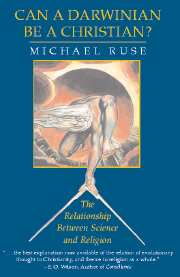Book contents
- Frontmatter
- Contents
- Preface
- Prologue
- CHAPTER ONE Darwinism
- CHAPTER TWO Christianity
- CHAPTER THREE Origins
- CHAPTER FOUR Humans
- CHAPTER FIVE Naturalism
- CHAPTER SIX Design
- CHAPTER SEVEN Pain
- CHAPTER EIGHT Extraterrestrials
- CHAPTER NINE Christian Ethics
- CHAPTER TEN Social Darwinism
- CHAPTER ELEVEN Sociobiology
- CHAPTER TWELVE Freedom and Determinism
- Epilogue
- Bibliography
- Index
CHAPTER SEVEN - Pain
Published online by Cambridge University Press: 05 June 2012
- Frontmatter
- Contents
- Preface
- Prologue
- CHAPTER ONE Darwinism
- CHAPTER TWO Christianity
- CHAPTER THREE Origins
- CHAPTER FOUR Humans
- CHAPTER FIVE Naturalism
- CHAPTER SIX Design
- CHAPTER SEVEN Pain
- CHAPTER EIGHT Extraterrestrials
- CHAPTER NINE Christian Ethics
- CHAPTER TEN Social Darwinism
- CHAPTER ELEVEN Sociobiology
- CHAPTER TWELVE Freedom and Determinism
- Epilogue
- Bibliography
- Index
Summary
The biggest question of all for the Christian believer is the “theodicy” problem. If, as the Christian believes, God is omnipotent (all-powerful) and all-loving, then why evil? If He is all-powerful, He could prevent evil, and if He is all-loving, then He would prevent evil. Yet evil exists. How do we explain it? What light for or against does Darwinism throw on this issue?
Utility Functions
It is customary and convenient to draw a distinction between two kinds of evil: moral evil, that is, human-caused evil – Auschwitz – and physical evil, that is, the pain of natural processes – the child with sickle-cell anaemia. Open to the Christian are a number of standard responses. The most popular and powerful argument to explain moral evil – one which goes back to Saint Augustine – is that it is something resulting from human free will. God in His love gave humans freedom, and that meant the freedom to do ill as well as good. Auschwitz is the result of human choice, human sinful choice, and as such is something for which God is not responsible, nor is it something that (having given us freedom) God could now stop. This does not mean that God is indifferent to suffering. He gave His life on the Cross to save us from our sins, and He suffers now with every evil act.
- Type
- Chapter
- Information
- Can a Darwinian be a Christian?The Relationship between Science and Religion, pp. 129 - 142Publisher: Cambridge University PressPrint publication year: 2000

